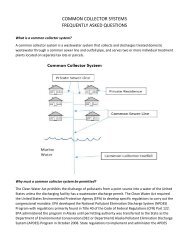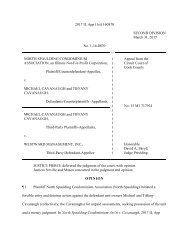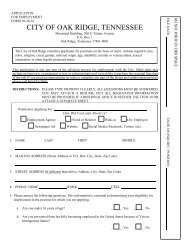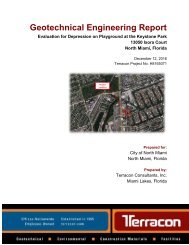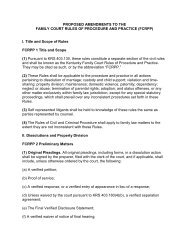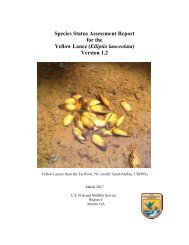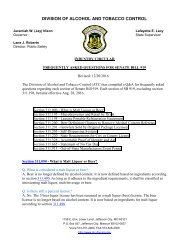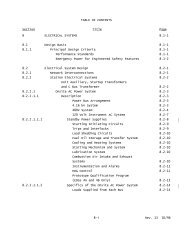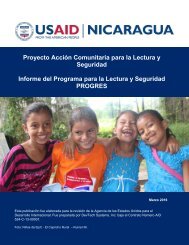COMMUNITY DISPUTE RESOLUTION IN TIMOR-LESTE
PA00MJQC
PA00MJQC
Create successful ePaper yourself
Turn your PDF publications into a flip-book with our unique Google optimized e-Paper software.
The Community Leaders Law was effective until July 2016. It provided that the “responsibilities” of a<br />
xefe de suku included “[f]avour[ing] the settlement of minor disputes involving two or more of the<br />
Suku’s aldeias”, 41 “[s]upporting such initiatives as are aimed at monitoring and protecting the victims<br />
of domestic violence and at dealing with and punishing the aggressor…”; 42 and “[r]equesting the<br />
intervention of the security forces in the event of disputes which cannot be settled at local level, and<br />
whenever crimes are committed or disturbances occur.” 43<br />
Interestingly, despite apparently requiring the xefe de sukus to request police intervention whenever<br />
a crime occurs, the Law nonetheless gave them the role of “punishing” perpetrators of domestic<br />
violence. Additionally, the dispute resolution function of xefe de sukus was described only as a<br />
responsibility to “favour” settlement where an inter-aldeia dispute occurred. The Law didn’t appear<br />
to engage with the reality of what is occurring at the suku level in practice, and nor did it usefully<br />
elaborate on the key provisions of the Constitution.<br />
In July 2016 a new Suku Law, Law No. 9/2016, was enacted. It addresses some of these deficiencies. It<br />
provides that “duties” of sukus include to “promote the a solution to litigation occurring within the<br />
community or between aldeias in the suku”. 44 Xefes de suku have the competency to “intervene,<br />
whenever requested, in the mediation of conflicts or disputes between community members” as well<br />
as “between the aldeias in the suku.” 45 Nonetheless, Xefes de suku are also to “inform the [police]<br />
about facts which can constitute a crime.” 46 The new Law does not refer to the punishment of<br />
domestic violence perpetrators.<br />
Nonetheless, while resolving these minor problems, the new Suku Law provides little new detail to<br />
regulate informal justice sector. It does not resolve the gaps in the Constitutional framework identified<br />
above. And indeed by using the term “mediation” it raises a new question of whether that specific<br />
type of procedure is intended to constitute the limits of xefe de sukus’ dispute resolution powers.<br />
Criminal procedure law<br />
The most detailed legal framework relevant to the informal justice sector is the Criminal Procedure<br />
Code (CPC). While the CPC is principally intended to regulate procedures in the formal justice system,<br />
it also touches upon the circumstances in which matters can be dealt with extra-judicially.<br />
Unfortunately, the Code establishes a regime which is complex and difficult for laypersons (indeed<br />
even lawyers) to understand.<br />
Two features of the CPC are particularly relevant to the informal justice sector. First, the CPC<br />
distinguishes between “public crimes” and “semi-public crimes”. Where a public crime is reported,<br />
prosecutors are in every instance required to conduct an investigation. An indictment must then be<br />
issued unless the evidence is insufficient, the perpetrator remains unknown, or the case would be<br />
inadmissible. 47 In contrast, “semi-public crimes” are only prosecuted where a complaint has been<br />
made by the victim or another specified person. 48 In a case involving a “semi-public crime”, it is also<br />
possible for the complainant to terminate proceedings by withdrawing the complaint, 49 and/or for the<br />
judge to attempt conciliation between the victim and defendant. 50 This distinction is intended to give<br />
victims control over the institution of criminal proceedings in relation to minor crimes.<br />
41<br />
Law No. 3/2009 on Community Leaders and Their Election, article 11(2)(c).<br />
42<br />
Law No. 3/2009 on Community Leaders and Their Election, article 11(2)(e).<br />
43<br />
Law No. 3/2009 on Community Leaders and Their Election, article 11(2)(f).<br />
44<br />
Law No. 6/2016 Suku Law, article 5(1)(c); see also article 6(1)(a).<br />
45<br />
Suku Law, article 23(1)(p) and (q).<br />
46<br />
Suku Law, article 23(1)(o)<br />
47<br />
Criminal Procedure Code, articles 235 and 236. (Article 235 provides for the circumstances in which a case<br />
may be dismissed. Article 236 requires that otherwise an indictment be issued.)<br />
48<br />
Criminal Procedure Code article 71, 211(3) and 214.<br />
49<br />
Criminal Procedure Code, article 216.<br />
50<br />
Criminal Procedure Code, article 262.<br />
11



